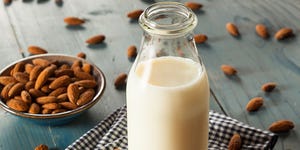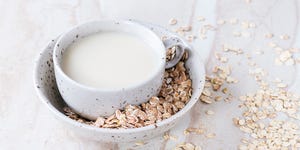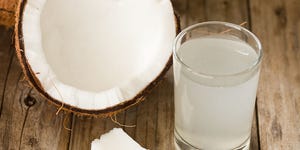Between coconut water and coconut oil, coconut is one superfood trend that won’t give up. And another way to get a taste of the tropics is with coconut milk, available both in a can and as a ready-to-drink bev (à la almond milk) in a box. Now that people are whirling it into smoothies, pouring it into their coffees, and more, you might wonder: Should I make it my first non-dairy milk choice?
I hate to bust the buzz, but coconut milk isn’t all it’s cracked up to be. “I wouldn’t consider coconut milk a health food,” says plant-based dietitian Julieanna Hever, RD, author of The Vegiterranean Diet. “When compared to soy or almond milk, coconut isn’t as healthy.”
But there are two ways to incorporate coconut milk into your diet. The first is the ready-to-drink coconut milk beverage, which is basically made with two ingredients: water and coconut cream (plus some added thickeners, natural flavor, and vitamins). The second is canned coconut milk. Made from coconut and water, it’s a thicker, more fat-packed version usually used in cooking—think: for making curry, not for sipping.
Coconut milk nutrition
Here’s what’s in one cup of an unsweetened coconut milk beverage (specifically, Califia Farms Go Coconuts):
*Some coconut milk beverages are fortified, and thus are a good source of the mineral. Read the nutrition facts label to know where yours stands.
Next up: a cup of unsweetened canned coconut milk. The biggest difference is that, as a richer source of fat, it contains three times the calories as the beverage.
Compare that to what’s in each cup of two percent dairy milk:
Benefits of coconut milk
One (potentially) good thing about coconut milk: It’s higher in fat than other non-dairy milks and contains just one carb. If you’re doing a super low-cab, high-fat diet like keto, you may want to incorporate coconut milk in order to meet your fat needs. And, of course, it’s a non-dairy alternative for anyone who is can’t drink cow’s milk.
You might also argue that a coconut milk beverage doesn’t contain that many calories (about 50 per cup). However, “calories aren’t everything. They don’t tell the whole picture. It’s the content of those calories that matter,” says Hever.



That’s where we get to the real issue: Coconut milk is high in saturated fat. The coconut milk beverage contains 4 grams of saturated fat. (Canned coconut milk has 12 grams of saturated fat per cup.) That means nearly all of the fat in coconut milk is the saturated type—and most of coconut milk’s calories come from sat fat.
But…wait. You may have heard that coconut milk’s saturated fat is a special, healthier type. Coconut is, in part, made up of medium-chain triglycerides (MCTs), which are said to be readily metabolized by the body for energy. However, “the science isn’t there yet to say that coconut is a good saturated fat. While it may be better than the type in animal products, we’re not sure yet,” says Hever. What experts do know is that excess saturated fat intake promotes cardiovascular disease, and the recommendations still stand to limit the amount you eat—this hasn’t changed just because coconut is trending.
The American Heart Association recommends capping saturated fat intake to five to six percent of your daily calories. Everyone’s body requires a different number of calories, but for the sake of easy math, if you’re consuming 2,000 calories daily, that’s 13 grams of saturated fat as your limit. One cup of coconut milk beverage is about one-third of that. If you’re also eating animal products, it’s easy to go over the edge. Saturated fat even adds up on a strictly vegan diet, says Hever. So it’s important to be mindful, regardless of your eating habits.
Speaking of vegan…check out these celebs who are damn proud of their vegan diets:
So should you drink coconut milk?
You probably shouldn’t drink it on the reg. What you can do is use limited amounts in your cooking, recommends Hever. “Coconut milk is amazing for cooking, in small doses,” she says. That means when you’re making a smoothie—a time when you’re probably adding a cup of liquid—Hever recommends using an unsweetened almond milk or a coconut water.
If you need the coconut milk taste, add a drop of coconut extract into the mix, she suggests. Another alternative is to make a cashew cream—simply soak and blend cashews in water—and adding a coconut extract to this for a rich, creamy coconut-y taste.
View this post on Instagram
A post shared by Heidi Larsen (@foodiecrush) on
Creating a homemade Thai or Indian curry? Go ahead and use coconut milk. On the days you have coconut milk, stay balanced by scaling back on the animal products you eat (including dairy), says Hever. (A veggie-packed curry might be perfect.)
Bottom line: Coconut milk can absolutely fit into your diet, but see it for what it really is: “treat coconut milk as a treat,” says Hever.
Source: Read Full Article
